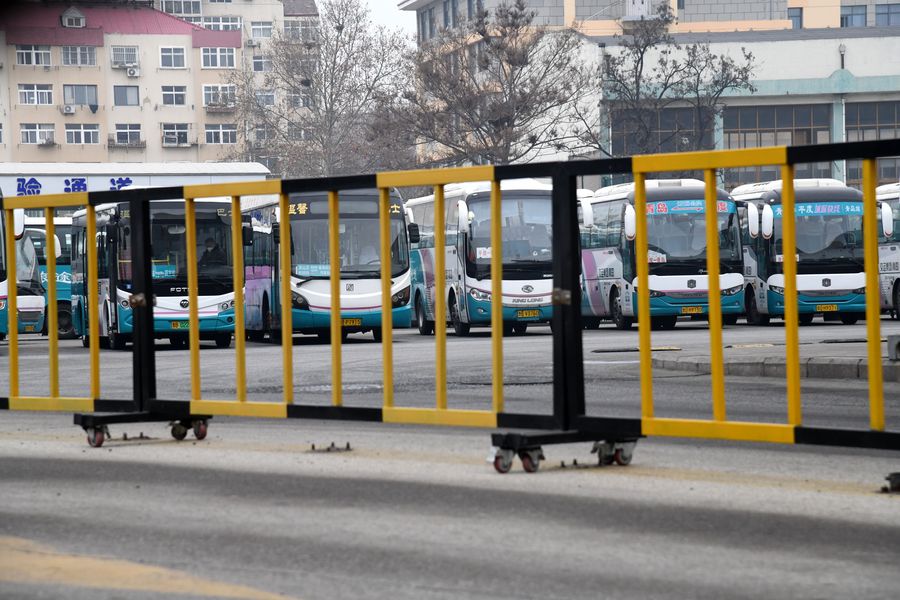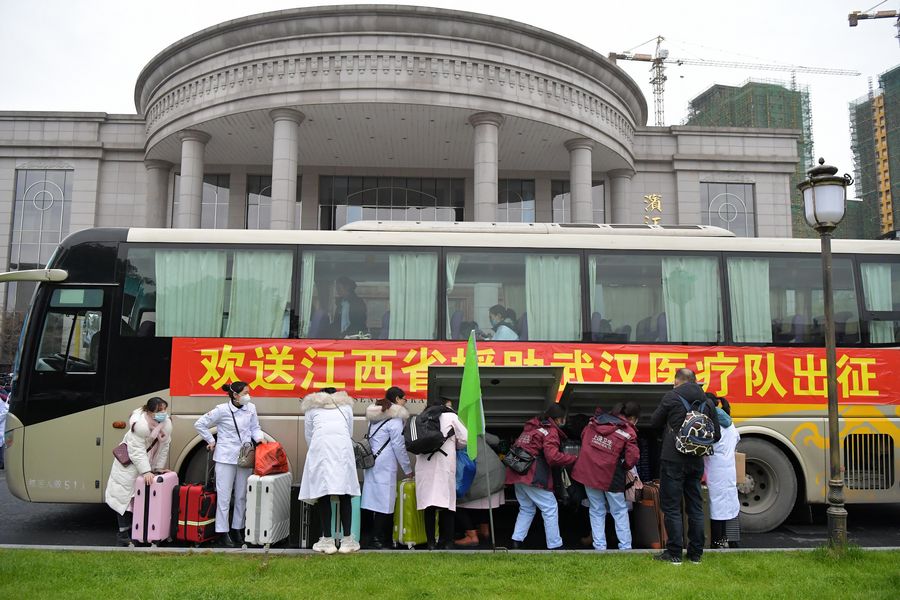To further contain the coronavirus epidemic, China has extended the Spring Festival holiday, postponed school openings and adopted transport restrictions.
Donations, funds, medical supplies and teams have been sent to central China's Hubei Province to contain the epidemic.
BEIJING, Jan. 27 (Xinhua) -- China extended the Spring Festival holiday and postponed school openings on Monday, while transport restrictions have been adopted in various areas to further contain the coronavirus epidemic.
The seven-day Spring Festival vacation, scheduled to end on Jan. 30, was extended to Feb. 2. Universities, primary and middle schools and kindergartens across the country will postpone the opening of the spring semester until further notice, according to the General Office of the State Council.
Entrusted by Xi Jinping, general secretary of the Communist Party of China (CPC) Central Committee, Premier Li Keqiang on Monday arrived in Wuhan, central China's Hubei Province, to inspect and direct the efforts for the prevention and control of the novel coronavirus outbreak.
In Wuhan, Li, also a member of the Standing Committee of the Political Bureau of the CPC Central Committee, thanked front-line medical workers for their all-out efforts in treating patients and urged them to pay attention to their own protection.
He required efforts to guarantee medical resources supply, race against time to treat patients and ensure adequate market supply and stable prices.
Chinese health authorities announced Monday that 2,744 confirmed cases of pneumonia caused by the novel coronavirus (2019-nCoV), including 461 in critical condition, had been reported in the country by the end of Sunday. The pneumonia situation has resulted in a total of 80 deaths. Fifty-one people have recovered.
Besides the temporary closures of public venues such as tourist sites, museums and cinemas and cancellations of gatherings, transport restrictions have been imposed in various areas as the country is still in its Spring Festival travel rush period.

Photo taken on Jan. 27, 2020 shows suspended buses at a bus terminal in Qingdao, east China's Shandong Province. (Xinhua/Li Ziheng)
On Monday, the northern port city of Tianjin and the eastern provinces of Zhejiang and Anhui as well as the southwestern city of Chongqing began to suspend inter-provincial highway passenger bus services. Previously, Shanghai and Qinghai Province had halted similar bus services.
Beijing has also launched temperature detection at 55 subway stations, including stops at railway stations and the Beijing Capital International Airport. Passengers with abnormal body temperatures will be sent to the hospital.
Beijing's subway stations and buses have also stepped up cleaning and disinfection work. Each carriage of the train is ordered to be disinfected every day. The entrances and exits, escalators, self-service machines, toilets and other public areas of subway stations are disinfected three times each day.

A staff member disinfects a bus at a bus terminal in Beijing, capital of China, Jan. 27, 2020. (Xinhua/Ren Chao)
Tianjin has asked all taxi drivers and passengers to wear masks and taxi drivers to disinfect the car after each passenger.
The Lanzhou bureau of China Railway on Monday suspended 30.5 pairs of trains to cities such as Guangzhou, Zhengzhou and Xi'an until Feb. 8.
Shopping malls are also reacting to the epidemic. Several malls in Beijing have shortened business hours in an effort to battle the novel coronavirus.
China has stressed all-around community-based efforts to prevent and control the spread of pneumonia caused by the novel coronavirus.
"We must give full play to the mobilization ability of primary-level communities, including rural communities, in personnel tracking and management among efforts to curb the spread of the virus," said He Qinghua, an official with the National Health Commission on Monday.
Strict measures have been implemented in rural areas.

A medical worker demonstrates how to correctly use masks in Wuying, a village of Miao ethnic group on the border of south China's Guangxi Zhuang Autonomous Region and southwest China's Guizhou Province, Jan. 26, 2020. (Xinhua/Huang Xiaobang)
"Our 96 grassroots staff members are all working right now. We have been visiting households and monitoring body temperatures of returning migrant workers every day," said Wu Lihui, Party official of a subdistrict office in the city of Shangrao, eastern China's Jiangxi Province.
Yang Xiaoxia, a villager in Lantian county, northwestern Shaanxi Province, planned to hold a large dinner party for her one-month-old grandson during the Spring Festival. However, she decided to postpone it because of the spreading coronavirus.
"A villager in our community canceled his wedding banquet," said Yang. "I will invite everybody over to celebrate when the outbreak is over."
Online medical consultation platforms were launched in many different places in China in an effort to relieve hospital pressure amid the novel coronavirus spread.
"Doctor, I have been coughing for two days. Do I have the coronavirus," Mr. Li from Chengdu, Sichuan Province, typed on his phone.
"Do you have a fever? Have you had close contact with anybody from Wuhan?" doctor Lin Jianmei from the people's hospital of Sichuan Province replied through the online medical consultation system.
After being told that he did not need to rush to the hospital and just needed to rest at home, Li was relieved.
"I have 'seen' over 50 patients every day since the launch of the online medical consultation platform. Some of the patients are consulting because of their cold symptoms, others are just having psychological stress," said Liu Jie, a doctor from the city of Guangyuan in Sichuan.
The online platforms can preliminarily screen the patients, relieve the pressure of some overly worried patients and allow patients in need to go to the hospital, said Fan Wei, a doctor from the city of Yuncheng in northern China's Shanxi Province.
In eastern China's Shandong Province, which has reported 63 confirmed cases of the new pneumonia, 48 hospitals have opened online fever clinic services to help control the epidemic.
Donations, funds, medical supplies and teams have been sent to Hubei to contain the epidemic situation.

Medical staff members load luggages on a bus before heading for Wuhan of Hubei Province in Nanchang, east China's Jiangxi Province, Jan. 27, 2020. (Xinhua/Peng Zhaozhi)
"The 2.4 million medical masks and over 100,000 items of protective clothing we produced have all been transported to Wuhan," said Che Jinjun, a worker at a medical equipment company in Rizhao, Shandong Province. All employees gave up their Spring Festival holidays.
On Monday, 410 doctors and nurses in three medical teams were formed in Fujian, Yunnan and Jiangxi provinces to leave for Wuhan. A number of medical teams from other provinces and the military are already in Wuhan treating patients. ■
(Reporting by Han Xiaojing, Li Laifang, Li Baojie, Wang Chenyang, Wei Yijun, Zhang Jianxin, Liu Weizhen, Li Jie, Liang Jun, Wang Bo, Zhang Zhilong, Wang Kai, Zhang Yizhi, Dong Xiaohong, Yue Wenwan, Yu Pei, Ji Ning; Video reporters: Yu Guoqing, Wang Siban, Rao Rao, Pan Zhiwei, Xu Yang, Yang Zhigang, Dong Bohan, Jiang Mingming, Zhao Dandan, Zhang Nan, Lin Juan, Wu Hongbo; Video editor: Liu Xiaorui)



